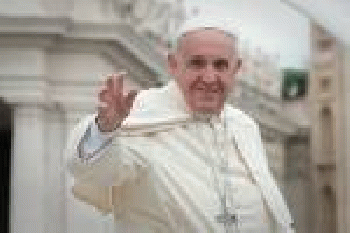
Canonization 2014-The Canonization of Saint John XXIII and. | Flickr1024 Ã-- 684 - 140k - jpg
(Image by flickr.com) Details DMCA
Duluth, Minnesota (OpEdNews) October 28, 2018: In the new book The Mind of Pope Francis: Jorge Mario Bergoglio's Intellectual Journey, translated from the Italian by Barry Hudock (Collegeville, Minnesota: Liturgical Press Academic, 2018; orig. Italian ed., 2017), Massimo Borghesi of the University of Perugia in Italy details the intellectual development the Argentine Jesuit Jorge Mario Bergoglio (born in December 1936), who rose through the ecclesiastical ranks to become Pope Francis in 2013.
Pope Francis is the first pope to take the name of Francis in honor of the Italian St. Francis of Assisi (1181-1226), the founder of the Franciscan religious order; the first pope from Latin America; and the first Jesuit pope. The Jesuit order was founded by St. Ignatius Loyola (1491-1556), author of the short book of instructions for guided imagistic meditation and contemplation known as the Spiritual Exercises, a minor classic in our Western cultural history that has been translated in to various languages by various Jesuits. Jesuit missionaries worked in Latin America. The 1986 movie The Mission, starring Robert de Niro and Jeremy Irons, commemorates the work of Jesuit missionaries in Latin America.
Now, the Uruguayan lay Catholic author and activist Guzman Carriquiry Lecour (born in 1944), who was appointed by Pope Francis in 2014 to serve as vice-president for the Pontifical Commission for Latin America, supplies the foreword in Borghesi's book (pages ix-xiv).
In Borghesi's book, complete bibliographic references are given in the footnotes at the foot of each page. Where a certain work has been translated into English, the English translation is given first, followed by the bibliographic information for the original work. However, many of the books that Borghesis discusses have not been translated into English.
Borghesi repeatedly quotes Austen Ivereigh's book The Great Reformer: Francis and the Making of a Radical Pope (New York: Henry Holt, 2014).
But I suspect that many readers of Borghesi's book might find it helpful to consult the "Bergoglio Timeline before the papacy" in Paul Vallely's book Pope Francis: Untying the Knots: The Struggle for the Soul of Catholicism, 2nd ed. (New York: Bloomsbury, 2015, pages 426-433).
Drawing on Vallely's timeline, I would highlight the following points in Bergoglio's life: On December 17, 1936, he was born in Flores, Buenos Aires; on March 11, 1958, the year in which Pope John XXIII was elected pope, Bergoglio entered the Society of Jesus; from 1971 to 1973, he served as the novice master at the Jesuit novitiate; on July 31, 1973, he became the Provincial of all the Jesuits in the Argentine Province (a six-year term of office, 1973-1979); from 1979 to 1986, Bergoglio served as the Rector of the Colegio Maximo; in 1986, he lived in Germany for a few months to work on a doctoral dissertation on the Italian-born German priest Roman Guardini, which he did not complete; in 1987, he was elected Procurator of the Jesuits; in 1990, he was exiled from the Jesuit community in Cordoba; in 1992, Bergoglio was appointed as Auxiliary Bishop of Buenos Aires; in 1997, he became the Coadjutor Archbishop of Buenos Aires; on February 28, 1998, he became the Archbishop of Buenos Aires; on February 21, 2001, he was made a Cardinal; on March 13, 2013, he was elected Pope.
Now, in Borghesi's "Introduction" (pages xv-xxx), he says, "In this complex relationship between unity and diversity lies the nucleus of Bergoglio's 'Catholic' thought. Here, its three polar pairs (fullness/limit, idea/reality, globalization/localization) take shape with four principles: time is superior to space; unity is superior to conflict; realities are superior to ideas; the whole is superior to the part" (page xxvi; also see pages 103-104). But what exactly does Bergoglio/Francis mean by these three polar pairs, and what exactly does he mean by these four principles? Borghesi's book is devoted to explaining Bergoglio/Francis' terminology.
Arguably the most effective way for me to give you an overview of Borghesi's narrative of Bergoglio/Francis' life and thought is to quote the table of contents with additional material incorporated in square brackets.
Borghesi's first chapter is titled "A Horizon Marked by Profound Contrasts" (pages 1-55). The subsections include the following:
"At the Origins of a System of Thought: [the French Jesuit Hegel scholar] Gaston Fessard and the Theology of 'As If'" (pages 1-19);
"[Argentine President] Juan Domingo Peron and the Church" (pages 19-28);
"The Unity of Universal and Particular, Center and Periphery: The Lesson of [Argentine Hegel Scholar] Amelia Podetti" (pages 28-36);
"City of God and Earthly City: The Relevance of Augustine [of Hippo]" (pages 36-44);
"The Pueblo Fiel as Theological Source" (pages 44-55).
(Note: You can view every article as one long page if you sign up as an Advocate Member, or higher).




